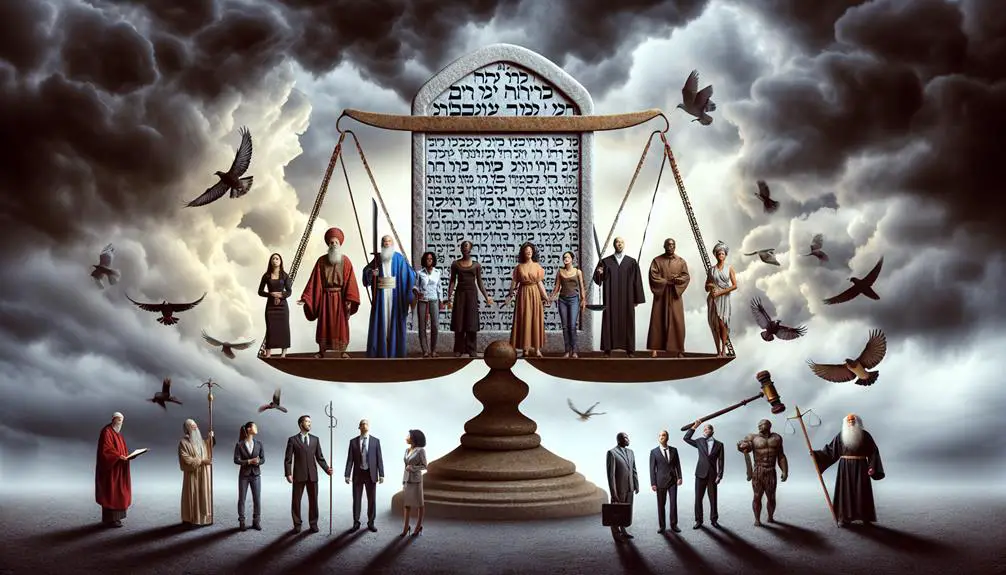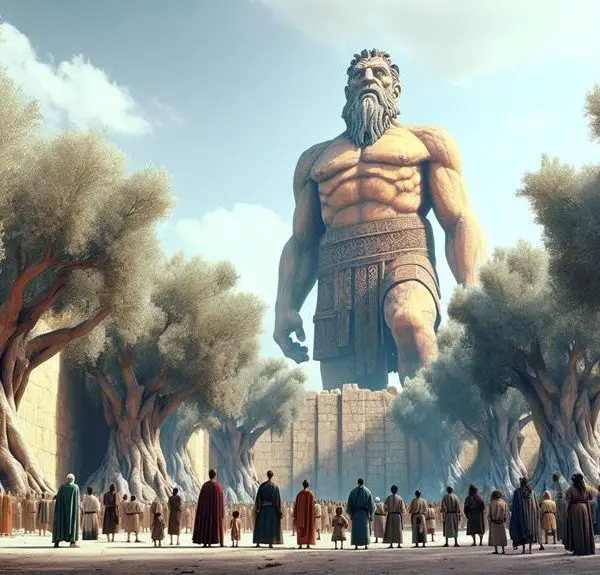Uncover the hidden layers behind the Bible's most debated verses, revealing truths that challenge and enlighten our understanding.

Controversial Verses in the Bible
Navigating the Bible's controversial verses is like walking through a minefield; you must tread carefully to understand the complexities beneath the surface. You've likely encountered passages that seem to endorse slavery, dictate rigid gender roles, or describe unsettling punishments.
These texts have sparked debates among scholars, believers, and skeptics alike. Yet, there's a deeper context and historical background that often goes unnoticed. By exploring these elements, you'll uncover insights that challenge your initial perceptions.
Stay with us as we unravel these complexities, offering a new perspective on ancient words that continue to shape our world.
Key Takeaways
- Many Bible verses on slavery and gender roles require contextual understanding for accurate interpretation.
- Interpretations of controversial verses vary widely due to cultural, theological, and historical influences.
- Biblical narratives often reflect complex justice systems and moral frameworks of their time.
- Understanding controversial verses involves considering theological, historical, and literary aspects holistically.
Slavery Endorsement Explained

Many passages in the Bible seemingly endorse slavery, a point that has sparked considerable debate and interpretation among scholars and theologians. You've likely encountered these verses and wondered how they fit into the broader moral landscape of the Bible. It's crucial to understand that these scriptures can't be viewed outside their historical context and cultural norms of the times in which they were written.
In ancient societies, slavery was a widespread institution, deeply embedded in the socio-economic structures. It's essential to grasp that the form of slavery mentioned in the Bible often differed significantly from the chattel slavery familiar in modern history, especially the transatlantic slave trade. Biblical references to slavery are situated within a context where servitude was a common means of settling debts, providing for the poor, or even a method for captives of war to integrate into society.
Analyzing these verses, you'll find that the Bible reflects the cultural norms of its era. However, it also introduces concepts of fairness, justice, and compassion towards slaves, which were revolutionary at the time. For example, the provision for the Year of Jubilee in Leviticus allowed for the emancipation of slaves, highlighting a move towards a more equitable treatment within the constraints of their society.
Understanding the historical and cultural backdrop of these passages helps you appreciate the complexity of interpreting ancient texts. It's not about condoning slavery but recognizing how the Bible navigated the realities of its time while planting seeds for moral progress.
Gender Roles and Authority

The Bible's depiction of gender roles and authority has been a subject of extensive analysis and debate among scholars, reflecting the complex interplay between religious texts and societal norms. You'll find that interpretations vary widely, influenced by cultural, theological, and personal perspectives. This diversity of interpretation affects how one understands women's leadership and marital dynamics within a scriptural context.
Aspect |
Implications |
|---|---|
Women's Leadership |
Historically contested; some passages restrict, others celebrate. |
Marital Dynamics |
Varied interpretations of submission and partnership. |
Cultural Influence |
Shapes understanding of gender roles in scripture. |
Theological Perspective |
Influences acceptance of women in church leadership. |
Societal Norms |
Reflects and impacts the application of biblical gender roles. |
In analyzing these aspects, it's crucial to recognize the inherent challenges in applying ancient texts to contemporary issues. For instance, women's leadership in religious and community settings often sparks debate due to passages that both limit and affirm women's roles. Similarly, marital dynamics as depicted in the Bible—encompassing themes of submission, love, and mutual respect—have been interpreted in ways that both challenge and reinforce traditional gender roles.
As you delve into these topics, remember that context is key. Understanding the historical, cultural, and situational background of biblical passages is essential for an informed interpretation. This approach allows you to appreciate the complexity of the Bible's teachings on gender roles and authority, recognizing that these teachings have evolved and been reinterpreted across generations to address changing societal norms.
Punishments and Moral Codes

Exploring biblical punishments and moral codes reveals a complex system of justice and ethics intertwined with the cultural and historical contexts of ancient societies. You'll find that these elements reflect not just a spiritual ethos but also practical considerations of the time.
The Bible prescribes a variety of laws and regulations, ranging from dietary restrictions to punishments for capital offenses. These guidelines weren't arbitrary but served to maintain social order and religious purity. Analyzing these aspects, you'll uncover:
- Dietary Laws: These laws, including prohibitions against consuming certain types of meat, weren't only spiritual mandates but also public health measures. They reflected an understanding of cleanliness and disease prevention in an era lacking modern medical knowledge.
- Capital Offenses: The Bible lists several crimes deemed worthy of the death penalty, such as murder and adultery. This severe form of punishment underscores the importance of societal norms and the value placed on community harmony.
- Property and Restitution: Laws concerning theft required the offender to make restitution, often multiple times the value of the stolen item. This system prioritized reparative justice over punitive measures.
- Family and Social Obligations: Commandments extend into personal and familial relationships, emphasizing respect, fidelity, and responsibility. These moral codes aimed to foster a cohesive and functioning society.
Understanding these biblical laws within their historical and cultural context allows you to appreciate their intention to guide moral behavior and maintain social order. It's clear that these ancient texts reflect a nuanced approach to justice and ethics, balancing divine commandments with practical human concerns.
Prophecies and Misinterpretations

Throughout history, biblical prophecies have often been subject to various interpretations and misinterpretations, shaping beliefs and actions in significant ways. These prophecies, especially those pertaining to end-time predictions and apocalyptic symbolism, have been particularly contentious. Their complexity and the vivid imagery employed lend themselves to a wide spectrum of understandings, often leading to significant theological and societal implications.
End-time prophecies, such as those found in the books of Daniel and Revelation, are rife with symbolic language that has been interpreted in myriad ways over the centuries. This has resulted in various Christian denominations forming distinct beliefs about the apocalypse and the events leading up to it. Misinterpretations can lead to the propagation of fear and the formation of extremist groups, each convinced of their own understanding of these prophetic texts.
To emphasize the complexity and the variety of interpretations, consider the following table which outlines common symbolic elements found in apocalyptic literature and a range of interpretations that have been ascribed to them:
Symbolic Element |
Possible Interpretations |
|---|---|
The Beast |
Political systems, historical figures, or future entities |
Babylon |
A literal city, a symbol of decadence, or corrupt religious systems |
The Number 666 |
A specific individual, a symbolic representation of imperfection, or a code for a name |
Four Horsemen |
Literal events, spiritual or political forces, or phases of human history |
This table illustrates the breadth of interpretations that can arise from the same set of symbols. It underscores the necessity for critical engagement with biblical prophecies and cautions against dogmatic assertions of singular interpretations.
Violence and Warfare Contextualized

Biblical narratives often embed instances of violence and warfare within contexts that demand careful interpretation to understand their significance and implications. You'll find that these stories, while initially appearing harsh, offer deeper insights when examined through the lenses of divine commands and historical context. Analyzing these aspects provides a nuanced understanding of the controversial verses related to violence and warfare in the Bible.
- Divine Commands: Many instances of violence in the Bible are depicted as being carried out under divine commands. It's crucial to understand the theological rationale behind these commands, which often aim at demonstrating God's sovereignty, executing divine justice, or purifying the community of believers from idolatry and sin. These narratives aren't endorsements of violence but rather serve specific, contextual purposes within the salvation history narrated in the Bible.
- Historical Context: The historical setting of these narratives plays a significant role in interpreting their meaning. Warfare and violence were common aspects of ancient Near Eastern societies. The biblical texts must be read with an awareness of the historical and cultural contexts in which they were written. This helps to differentiate between descriptive accounts of historical events and prescriptive commands.
- Moral and Ethical Frameworks: The Bible often presents moral and ethical dilemmas through stories of violence and warfare, challenging readers to reflect on the complexities of justice, mercy, and righteousness.
- Redemptive Narratives: Some stories of violence point towards future hope and redemption, highlighting a trajectory towards peace and reconciliation in the biblical narrative.
Frequently Asked Questions
How Do Modern Theologians Reconcile the Seemingly Contradictory Messages of Love and Judgment Found in Different Parts of the Bible?
To reconcile the messages of love and judgment in the Bible, modern theologians often discuss divine paradoxes and moral absolutes. They suggest that these seemingly contradictory messages actually reflect the complex nature of divine principles.
In What Ways Have the Controversial Verses in the Bible Impacted Interfaith Dialogue and Relations Between Different Religious Communities?
You're walking on thin ice when navigating interfaith dialogue, especially regarding scriptural literacy and education. These discussions often spotlight how diverse religious communities interpret their sacred texts.
Controversial verses have, surprisingly, fostered a deeper understanding and respect among different faiths. By engaging in scholarly, analytical conversations, individuals enhance their interfaith education, bridging gaps and mitigating misunderstandings.
This approach has gradually improved relations, proving knowledge is a powerful tool for unity.
How Do Translations and Different Versions of the Bible Affect the Interpretation of Controversial Verses?
When you delve into how translations and different versions of the Bible affect interpretation, you're exploring the impact of translation methodologies and cultural context.
Each translation carries its interpreters' biases and the cultural nuances of its time, shaping how verses are understood. As you analyze various translations, you'll notice shifts in meaning that can significantly alter comprehension.
Understanding these factors is crucial for a nuanced interpretation of any text, especially one as widely read as the Bible.
What Role Do These Controversial Verses Play in the Debate About the Separation of Church and State in Contemporary Society?
You'd find it interesting that 65% of Americans believe in the separation of church and state. This belief shapes how controversial verses impact legal implications and educational curriculum.
These verses often ignite debates, challenging the boundary between personal beliefs and public policy. Their role in contemporary society is pivotal, as they question the extent of religious influence on laws and education, urging a careful balance to maintain both religious freedom and secular governance.
How Have Perceptions of These Controversial Verses Changed With Advancements in Science, History, and Cultural Understandings?
As you delve into how advancements in science, history, and cultural understandings have influenced perceptions, it's clear that both scientific reinterpretations and cultural shifts play crucial roles.
You'll find that modern science often challenges traditional interpretations, leading to a more nuanced understanding. Similarly, evolving cultural norms and increased historical knowledge have prompted reevaluations, fostering a richer, more complex grasp of these texts within their historical context.
Conclusion
In conclusion, navigating the murky waters of these controversial verses requires a nuanced understanding, much like deciphering a complex puzzle from ancient times.
You've seen how context transforms perception, from the endorsement of slavery to the delineation of gender roles, and from severe punishments to the intricacies of prophecies.
Each verse, when examined under the scholarly lens, reveals not just a snapshot of historical ethos but also a dynamic interplay between tradition and interpretation, guiding you through the labyrinth of biblical discourse.



Sign up